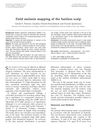
Microneedle technology is effective for skin rejuvenation and enhancing cosmeceutical delivery, with ongoing innovation and increasing commercialization.
 1 citations,
October 2021 in “Cureus”
1 citations,
October 2021 in “Cureus” Platelet-rich plasma treatment may safely and effectively reduce skin lesions in psoriasis and atopic dermatitis.
4 citations,
August 2015 in “Journal of Cosmetic Dermatology” Sunscreens with UVA blockers effectively reduce skin fluorescence for several hours.
 7 citations,
November 2011 in “Skin Research and Technology”
7 citations,
November 2011 in “Skin Research and Technology” The study found a specific pattern of uneven melanin distribution on balding scalps that could help understand skin diseases caused by light exposure.
 106 citations,
September 2010 in “Stem cells”
106 citations,
September 2010 in “Stem cells” Skin-derived precursors in hair follicles come from different origins but function similarly.
 19 citations,
October 2017 in “The FASEB Journal”
19 citations,
October 2017 in “The FASEB Journal” Male hormones cause different growth in identical human hair follicles due to their unique epigenetic characteristics.
 August 2023 in “Journal of Investigative Dermatology”
August 2023 in “Journal of Investigative Dermatology” Different body areas have unique skin cell communication patterns, explaining why certain skin diseases occur in specific regions.
 205 citations,
July 2009 in “Journal of Dermatological Science”
205 citations,
July 2009 in “Journal of Dermatological Science” Male and female skin differ in many ways, which could lead to gender-specific skin treatments.
 69 citations,
December 2016 in “Facial plastic surgery”
69 citations,
December 2016 in “Facial plastic surgery” Different types of facial fat affect aging and treatment outcomes; more research is needed to enhance anti-aging procedures.
 18 citations,
January 2020 in “Indian Dermatology Online Journal”
18 citations,
January 2020 in “Indian Dermatology Online Journal” Platelet-rich plasma shows potential for hair loss and skin rejuvenation but needs more research for widespread use.
 January 2011 in “Web journal anti-aging medicine/Anti-aging medicine”
January 2011 in “Web journal anti-aging medicine/Anti-aging medicine” KGS1 tablets improved skin and hair health.
 July 2019 in “Journal of the European Academy of Dermatology and Venereology”
July 2019 in “Journal of the European Academy of Dermatology and Venereology” Some eczema treatments may cause conjunctivitis, many people have sensitive eyes, air pollution can increase skin wrinkles, hair loss medication does not affect sexual function, and dermatologists can help identify torture signs on refugees' skin.
115 citations,
April 2010 in “Archives of Dermatology” Surgical face-lifts are more effective, but fractional radiofrequency is a good, less invasive alternative for treating skin laxity.
 December 2008 in “The American Journal of Cosmetic Surgery”
December 2008 in “The American Journal of Cosmetic Surgery” Multi-pass laser skin treatments improved healing, reduced pain, and had no major complications.
23 citations,
December 2008 in “Current medicinal chemistry” Stimulating sensory neurons can increase IGF-I production, which may help treat various diseases and improve tissue health.
8 citations,
August 2017 in “Skin appendage disorders” Red dots on the upper chest may be an early sign of certain types of hair loss.
 July 2024 in “Periodontology 2000”
July 2024 in “Periodontology 2000” Autologous platelet concentrates show promise in esthetic treatments but need more standardized research.
 9 citations,
January 2020 in “Postepy Dermatologii I Alergologii”
9 citations,
January 2020 in “Postepy Dermatologii I Alergologii” Frontal fibrosing alopecia is a poorly understood condition with increasing cases and unclear treatment effectiveness.
 April 2018 in “The journal of investigative dermatology/Journal of investigative dermatology”
April 2018 in “The journal of investigative dermatology/Journal of investigative dermatology” Samcyprone ointment is effective for treating common warts if a sensitization reaction occurs first.
 3 citations,
January 2021
3 citations,
January 2021 Non-surgical treatments like thread lifts, PRP therapy, HIFU, and radiofrequency effectively rejuvenate and tighten facial skin.
 September 2016 in “Springer eBooks”
September 2016 in “Springer eBooks” Looking older on the outside might be linked to aging faster on the inside and can be affected by lifestyle choices and health risks.
 31 citations,
January 2019 in “Journal of Cutaneous Medicine and Surgery”
31 citations,
January 2019 in “Journal of Cutaneous Medicine and Surgery” Platelet-Rich Plasma (PRP) therapy can promote hair growth and improve facial aesthetics, including reducing acne scars and facial burns, and it works best with three initial monthly injections.
 9 citations,
July 2020 in “Journal of Dermatology”
9 citations,
July 2020 in “Journal of Dermatology” Asian patients with Frontal Fibrosing Alopecia often lose eyebrow hair and respond well to combined antiandrogen or antimalarial and topical treatments.
 April 2005 in “Clinics in Plastic Surgery”
April 2005 in “Clinics in Plastic Surgery” Various surgical techniques effectively treat skin diseases and cosmetic issues.
 204 citations,
February 2000 in “Current Medicinal Chemistry”
204 citations,
February 2000 in “Current Medicinal Chemistry” Antiandrogens like flutamide are effective in treating conditions like prostate cancer and hair loss, but there's a need for more potent versions. Understanding their structure can help develop better treatments.

Tiny particles called extracellular vesicles show potential for improving skin health in cosmetics, but more research is needed to confirm their safety and effectiveness.
 80 citations,
March 2008 in “Contact Dermatitis”
80 citations,
March 2008 in “Contact Dermatitis” Nearly half of the French individuals surveyed reported having a sensitive scalp, more common in women, often linked to hair loss and symptoms like itching, and triggered by factors including shampoos and pollution.

Sunekos® effectively improves labia majora appearance and is well-tolerated.
 19 citations,
September 2015 in “Therapeutic Delivery”
19 citations,
September 2015 in “Therapeutic Delivery” Active transdermal technologies in cosmetics help deliver skin treatments effectively, but their safety and effectiveness depend on skin type and treatment choice.
 81 citations,
June 2014 in “American Journal of Men's Health”
81 citations,
June 2014 in “American Journal of Men's Health” Finasteride can cause lasting sexual, emotional, and cognitive issues, with varying severity.


























